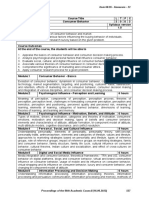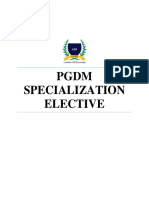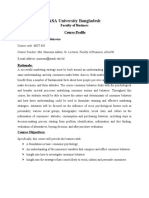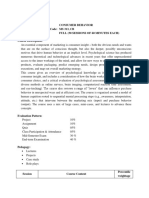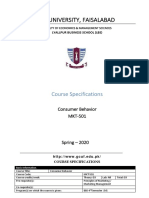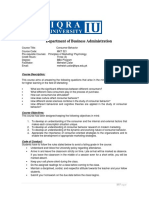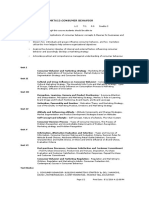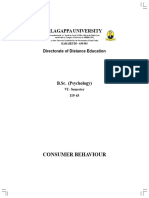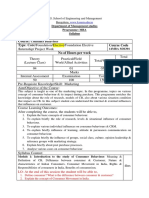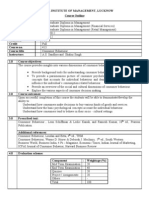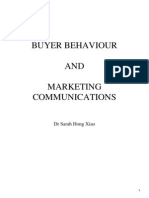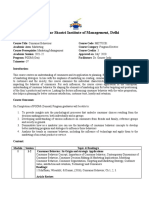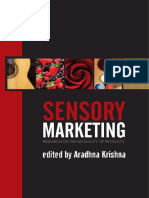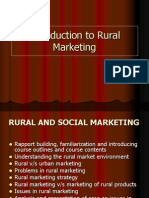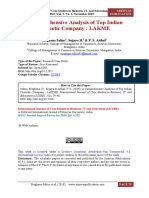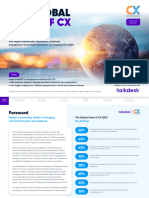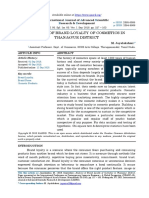Consumer Behaviour
Course Code: Credit - 4
Objective: The course analyzes the behavioral dimension of the marketing. The course enables to
understand how cultural, social, psychological and personal factors influence the consumer decision
making in order to develop suitable marketing interventions.
Course Content
Unit 1: Introduction to consumer behavior –Definition of consumer behavior, applications of
consumer behaviour -Consumer behavior and marketing strategy, Consumer research-Primary and
secondary methods-tools used-survey, focus groups, personal interviews, projective techniques,
Consumer segmentation-bases of segmentation-demographic, behavioural benefit.
Unit 2: Influence of social class -Definition and meaning of social stratification-factors responsible for
social stratification-characteristic features of social classes- social influence on consumer behavior.
Group Dynamics and consumer reference groups- definition and meaning of group – reasons for
formation of group- types of groups relevant to consumer behaviour information
Unit 3: Individual determinants-Perception-factors in perception- meaning of perception- perceptual
process-factors responsible for perceptual distortion, Learning- Weber’s law-Classical conditioning-
operant conditioning-marketing implications- Components of learning process, Personality and emotion,
Personality –meaning and nature – characteristics of personality- stages in the development of
personality- personality influences and consumer behaviour
Unit 4: Motivation – needs - goals- dynamic characteristics of motivation – consumer imagery and
perceived risk, hard core behavioural perspective-social learning perspective-cognitive approach-
biological approach-rational expectations psychoanalytical perspective-Maslow’s hierarchy of needs-
Properties of motivation- Three main types of conflicts- Attitudes-definition beliefs- affect- behavioural
intention-attitude changing strategies.
Unit 5: Self concept, situational influences and lifestyle-overview, Consumer decision making process.
Unit 6: Consumption and post purchase behaviour: Consumer satisfaction concept, cognitive
dissonance, consumer delight, Consumer Value, Consumer Value Delivery Strategies, Competitive
advantage through customer value Information – Customer value determination process - Measuring
customer satisfaction.
Text Books:
Schiffman L.G. and Kanuk L.L., Consumer Behaviour, 9th Edition, Prentice Hall of India, New
Delhi.
Solomon, Michael R. (2016), Consumer Behaviour: Buying, Having and Being, 11/e, Pearson
Education
71
�
Reference Books:
Seth, J. N. & Mittal, B. (2nd ed., 2003). Customer Behaviour-A Managerial Perspective.
Thomson South-Western.
Hawkins, D. I. & Roger, J. B. and Kenneth, A.C. (2001). Consumer Behaviour-Building
Marketing Strategy. Irwin McGraw-Hill, New York.
Integrated Marketing Communications
Course Objectives
1. To understand the concept and principles of advertising
2. To analyze various advertising media and costs associated with them.
3. To design and execute diverse types of advertisement.
Unit 1 Introduction to IMC
Concept, communication mix, role at different stages of PLC, Marketing Communications Processes &
Consumer Response Models: Basic model of communication, Response Hierarchy models and
alternatives, FCB Planning Grid, Cognitive Response Model, Elaboration Likelihood Model of Persuasion
Unit 2 Strategic Planning for IMC
Basis of strategic planning: USP, Brand Image & Personality, Positioning, Strategic planning: target
profiling, objective determination:, DAGMAR approach, budget setting, Strategic planning for
advertising: advertising appeals, advertising campaign and media briefs. Advertising research; Evaluation
of campaign effectiveness, metrics and ROI
Unit 3 Designing & Implementing IMC
Media channels & their characteristics, Overview of media planning, media strategies: scheduling, target
market coverage, reach vs frequency, Marketing communications budgets;
Unit 4 Marketing Communications Mix
B2B communications, Sales promotions, Marketing Public Relations, Personal Marketing: Direct
Marketing; CRM; Relationship Marketing, Experiential Marketing: sponsored events, exhibitions & trade
fairs etc, Moment of Truth Marketing: Brand Identity, Packaging & Retail Media, Influence Marketing:
Digital, Social & Interactive Media
Unit 5 Perspectives on Advertising
Global & Cross-cultural Marketing Communications, Ethics in IMC, Changing role of advertising
agencies
Recommended Textbooks
72
